
By the age of 22, Richard Hughes was a graduate student at the University of Arkansas at Little Rock and had been promoted to the Arkansas State Board of Health by Governor Huckabee. But in March of 2006, his life took a drastic turn. Hughes was diagnosed with an aggressive brain tumor, stage four Glioblastoma.
Hughes' neurosurgeon opted for a craniotomy and chemotherapy. After getting a second opinion, Hughes learned that he actually had Ganglioglioma grade 2 cancer and, assuredly, a more curative cancer. "Cancer turned my life upside down," says Hughes. "It made me assess my life. My faith got me through it."
Now cancer free, Hughes uses his position on the State Board of Health to help others who are fighting cancer. A graduate student at UAMS, Hughes is getting his Masters in Public Health and is focusing on public health campaigns in Arkansas. "Growing up my focus was on politics and policy, and after having cancer, my perspective shifted to health policy," says Hughes.
Hughes is also active in American Cancer Society advocacy initiatives, including volunteering for the ACS CAN Fight Back Express bus that rolled through the state in July 2008. He has also had the opportunity to lobby in Washington D.C., along with other volunteers, for FDA regulation of tobacco products and for increased funding for cancer research.
A Jonesboro native and graduate of Arkansas State University, Hughes is enjoying his time working to promote health policy throughout the state. "I want to help others who are facing cancer, and health policy is my niche," says Hughes.
For more information on the American Cancer Society's advocacy initiatives or how to become a volunteer, call 1-800-ACS-2345 or visit www.cancer.org/takeaction.
Friday, December 19, 2008
Fighting Cancer On Capitol Hill
Posted by Richard Lawry at 3:53 PM 0 comments
Tuesday, December 9, 2008
Cancer Will Be World's Top Killer

Cancer will overtake heart disease as the world's top killer by 2010, part of a trend that should more than double global cancer cases and deaths by 2030, international health experts said in a report released Tuesday.
Rising tobacco use in developing countries is believed to be a huge reason for the shift, particularly in China and India, where 40 percent of the world's smokers now live.
So is better diagnosing of cancer, along with the downward trend in infectious diseases that used to be the world's leading killers.
Cancer diagnoses around the world have steadily been rising and are expected to hit 12 million this year. Global cancer deaths are expected to reach 7 million, according to the new report by the World Health Organization.
An annual rise of 1 percent in cases and deaths is expected — with even larger increases in China, Russia and India. That means new cancer cases will likely mushroom to 27 million annually by 2030, with deaths hitting 17 million.
Underlying all this is an expected expansion of the world's population — there will be more people around to get cancer.
By 2030, there could be 75 million people living with cancer around the world, a number that many health care systems are not equipped to handle.
"This is going to present an amazing problem at every level in every society worldwide," said Peter Boyle, director of the WHO's International Agency for Research on Cancer.
Boyle spoke at a news conference with officials from the American Cancer Society, the Lance Armstrong Foundation, Susan G. Komen for the Cure and the National Cancer Institute of Mexico.
The "unprecedented" gathering of organizations is an attempt to draw attention to the global threat of cancer, which isn't recognized as a major, growing health problem in some developing countries.
"Where you live shouldn't determine whether you live," said Hala Moddelmog, Komen's chief executive.
The organizations are calling on governments to act, asking the U.S. to help fund cervical cancer vaccinations and to ratify an international tobacco control treaty.
Concerned about smoking's impact on cancer rates in developing countries in the decades to come, the American Cancer Society also announced it will provide a smoking cessation counseling service in India.
"If we take action, we can keep the numbers from going where they would otherwise go," said John Seffrin, the cancer society's chief executive officer.
Other groups are also voicing support for more action.
"Cancer is one of the greatest untold health crises of the developing world," said Dr. Douglas Blayney, president-elect of the American Society of Clinical Oncology.
"Few are aware that cancer already kills more people in poor countries than HIV, malaria and tuberculosis combined. And if current smoking trends continue, the problem will get significantly worse," he said in a written statement.
Posted by Richard Lawry at 11:18 AM 0 comments
Saturday, December 6, 2008
Cancer Declines

Publicly released November 25, the “Annual Report to the Nation on the Status of Cancer", reported something quite remarkable: for the first time in the ten-year history of these reports, cancer incidence and death rates for both men and women are declining. Though cancer death rates have been decreasing since the early 1990s, the new report highlights that cancer incidence rates are dropping as well.
American Cancer Society Relay For Life volunteers have been a critical part of the fight against cancer for the past 25 years and can take pride in the news that every dollar raised is helping to fund major progress in our mission to eliminate cancer as a major health problem.
Posted by Richard Lawry at 6:12 AM 0 comments
Labels: cancer annual report
Monday, December 1, 2008
One In Three

One in three people will be diagnosed with cancer during their lifetime. That is a scary statistic. Think about that the next time your are in a group of people. One out of three will be diagnosed with cancer.
That is why we are involved in Relay For Life. The funds raised at Relay events save lives by funding cutting-edge cancer research, early detection and prevention education, advocacy efforts, and life-affirming patient services. It is because of your involvement that we are able to save lives, help those battling cancer, and empower all to fight back against the disease.
Posted by Richard Lawry at 7:48 PM 0 comments
Thursday, November 20, 2008
Volunteer Steve Sparks

Volunteering your time is one of the most valuable items you can give. Ordinarily, most college students can find numerous groups on campus to volunteer for, but when Steve Sparks discovered that the University of Arkansas did not have a Colleges Against Cancer program, he decided to create his own.
After his father, Jim, was diagnosed with stage three colon cancer, Sparks wanted to do what he could to fight the disease. "I was looking for a good opportunity to volunteer and to bring awareness to colon cancer," says Sparks, who is a native of Beebe, Ark. "The American Cancer Society deals with every type of cancer."
For the past two years, Sparks has been president of the Colleges Against Cancer program. With 120 active members, Sparks' efforts have been a huge success on campus. "We are the fourth largest club on campus, there are no dues, and everyone contributes," says Sparks.
The group participates in several American Cancer Society activities including the Great American Smokeout and Relay For Life. Last year, the campus hosted its first Relay For Life and raised $10,000.
Today Sparks is proud to report that his father has been cancer free for seven years. And he has no doubt that the group he started will continue to be a success after he graduates this May. "We are well prepared, we have 15 chair positions, and anyone who takes over will be in good hands," he says.
Upon graduating, Sparks plans to attend Optometry school at the Southern College of Optometry in Memphis or North Eastern State University in Tahlequah, Oklahoma.
For more information on volunteering or the programs offered by the American Cancer Society, call 1-800-ACS-2345 or visit www.cancer.org.
Posted by Richard Lawry at 2:04 PM 0 comments
Labels: university arkansas volunteer
Tuesday, November 18, 2008
Bake Sale

There will be a bake sale in the Comfort Cafe at Mena Regional Health System on Tuesday, November 25th from 6:30 A.M. until 10:30 A.M. All proceeds will go to the Polk County relay For Life.
Posted by Richard Lawry at 1:41 PM 0 comments
Monday, November 17, 2008
History of Relay For Life

Relay For Life is a life-changing event that brings together more than 3.5 million people to:
• Celebrate the lives of those who have battled cancer. The strength of survivors inspires others to continue to fight.
• Remember loved ones lost to the disease. At Relay, people who have walked alongside people battling cancer can grieve and find healing.
• Fight Back. We Relay because we have been touched by cancer and desperately want to put an end to the disease.
One person can make a difference. Nowhere is that more evident than with the story of the American Cancer Society Relay For Life, which began in Tacoma, Washington. In the mid-1980s, Dr. Gordy Klatt, a Tacoma colorectal surgeon, wanted to enhance the income of his local American Cancer Society office and to show support for all of his patients who had battled cancer. He decided to personally raise money for the fight by doing something he enjoyed – running marathons.
In May 1985, Dr. Klatt spent a grueling 24 hours circling the track at Baker Stadium at the University of Puget Sound in Tacoma. He ran for more than 83 miles. That first year, nearly 300 of Dr. Klatt's friends, family, and patients watched as he ran and walked the course. Throughout the night, friends donated $25 to run or walk with Dr. Klatt for 30 minutes. His efforts raised $27,000 to fight cancer.
While circling the track those 24 hours, Dr. Klatt thought about how others could take part in his mission to fight cancer. He envisioned a 24-hour team relay event that could raise more money to fight cancer. Over the next few months, he pulled together a small committee to plan the first team relay event, known as the City of Destiny Classic 24-Hour Run Against Cancer.
In 1986, with the help of Pat Flynn – now known as the “Mother of Relay” – 19 teams took part in the first team Relay event on the track at the historic Stadium Bowl and raised $33,000. An indescribable spirit prevailed at the track and in the tents that dotted the infield.
In 2009 there will be Relay For Life events in over 5,000 communities. Check and see if you community is one of them, and if it is plan to participate.
Posted by Richard Lawry at 7:14 PM 0 comments
Friday, November 14, 2008
This Little Light Of Mine
Video from the Mid-South Division Relay For Life Leadership Summit in Nashville, Tennessee.
Posted by Richard Lawry at 5:46 PM 0 comments
Thursday, November 13, 2008
Survivors

A cancer diagnosis is a journey filled with many new and different experiences for survivors. Within the American Cancer Society Relay For Life activities and events, we strive to demonstrate respect for the many ways in which each person touched by cancer defines themselves and their experiences.
The American Cancer Society considers a cancer survivor to be anyone who defines himself or herself this way, from the time of diagnosis throughout the balance of his or her life.
Survivors are a very important part of every Relay for Life event. There are a variety of creative ways we celebrate our survivors, whether it is enjoying a reception, walking in the opening lap, wearing a survivor t-shirt, or being honored during the luminaria ceremony. Survivors are the reason we relay.
At last years Relay For Life event here in Mena, I was talking with a survivor who told me, “without those who support and participate in Relay For Life and other fundraisers and research efforts, I wouldn’t be a survivor.”
That in a nutshell is why those of us who are involved in Relay for Life give of our time, effort and money. We want more survivors!
Posted by Richard Lawry at 12:06 PM 1 comments
Tuesday, November 11, 2008
Leadership Summit 2
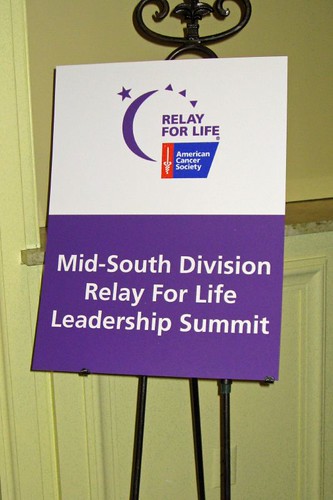
What a busy few days we have had. Last Thursday morning, we headed for Nashville, Tennessee. We met the rest of the Relay For Life Leadership Summit attendees from our area in Little Rock. We caravaned with them to Jackson, Tennessee where we stopped for the night. When we entered the hotel we were met with a sign greeting us.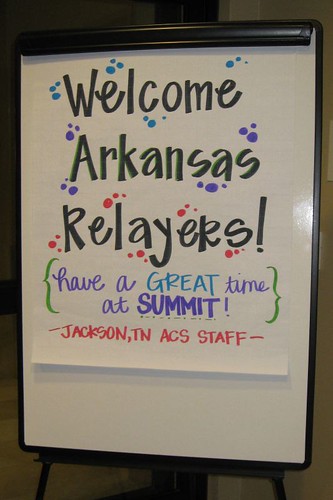
After a good nights sleep we headed towards Nashville. The autumn colors were exceptional. I have never traveled on an Interstate highway that was so beautiful. We stopped at a rest area, and I took a few pictures of the fall foliage. 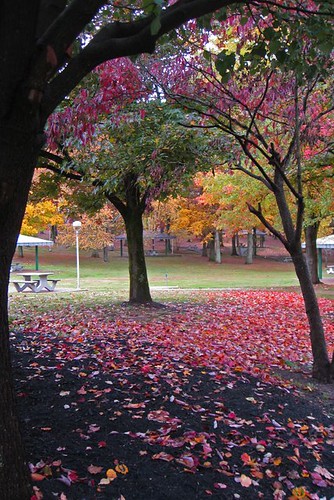


We arrived at the Opryland Hotel at around 11:00 A.M. If you have never seen the Opryland Hotel, I can't really explain it to you. It is the largest hotel in the U.S. that doesn't have a casino. It has 2,881 guest rooms and over 600,000 square feet of meeting space. The hotel is spread across nine acres and includes a natural indoor atrium that features winding rivers, walking paths, marvelous landscaping, and peaceful waterfalls year-round.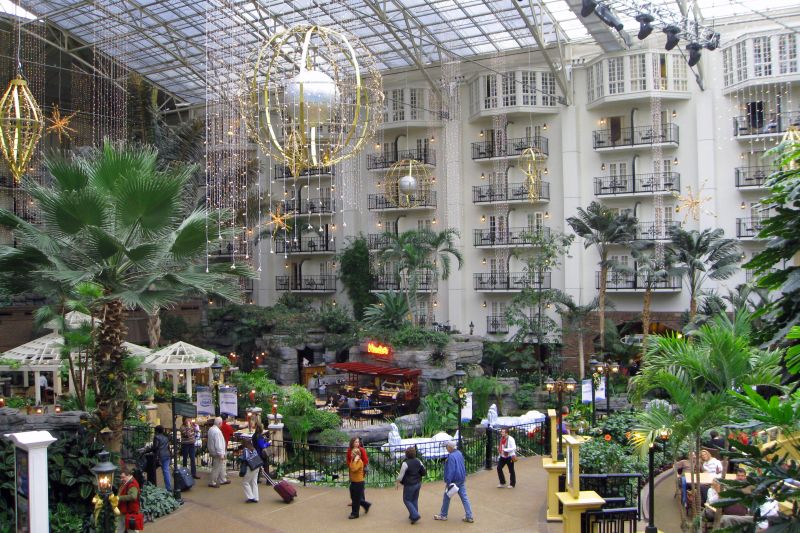
We checked into our room, and then registered for the Leadership Summit. There were over 1200 people attending the Relay For Life training event. There were Relayers from the six states of Alabama, Arkansas, Kentucky, Louisiana, Mississippi and Tennessee along with special guests from South Africa. The Leadership Summit was the first-ever divisionwide Relay For Life training event. There were inspirational speakers, and lots of information at the breakout workshop sessions.
I really enjoyed the summit, but being that crowded does make me a bit uncomfortable. There were more people in the hotel than people who live in my hometown of Mena. As crowded as the Relay For Life summit was, It was only one of several conventions that were occurring in the hotel.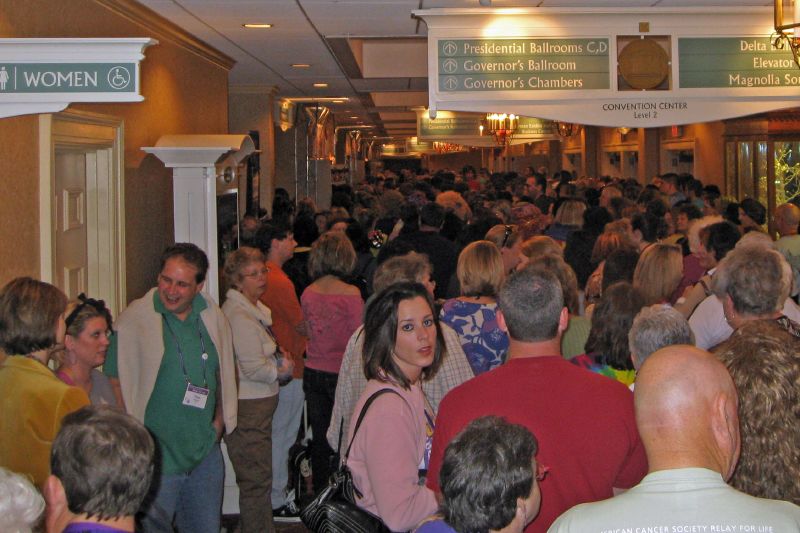
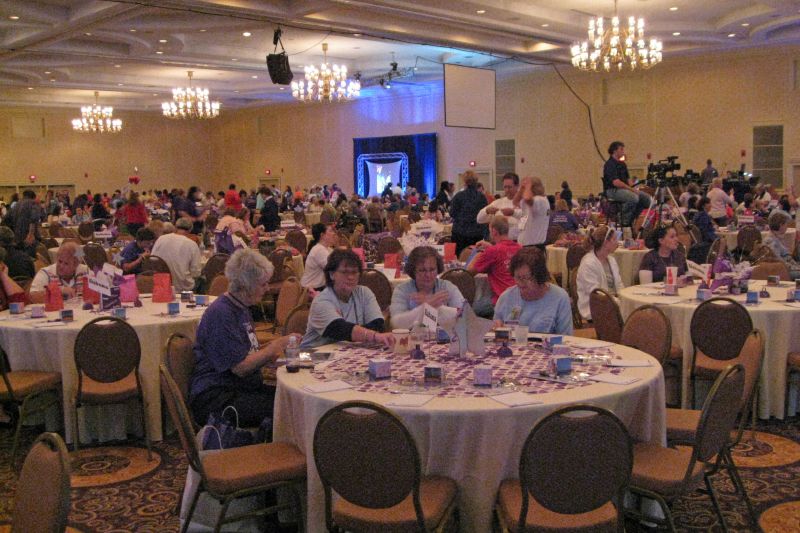
One of the most inspiring things was when we were introduced to a young girl who was a cancer survivor. Even though she was blind, you could feel her enthusiasm for life. She sang "This Little Light Of Mine", as all of us in the audience shined our flashlights.
The Leadership Summit left Gina and I inspired and full of ideas for the Relay For Life that will be held here in Polk County in 2009.
GINA AND I WITH OUR ACS STAFF PERSON STINA
Posted by Richard Lawry at 2:55 PM 0 comments
Thursday, November 6, 2008
Leadership Summit

Gina and I are leaving today for the Relay For Life Leadership Summit to be held at Opryland Resort and Convention Center in Nashville, Tennessee the 7th and 8th of November. We are looking forward to attending.
Relay For Life is the American Cancer Society’s signature activity. It offers everyone in a community an opportunity to participate in the fight against cancer. Teams of people camp out at a local high school, park, or fairground and take turns walking or running around a track or path. Each team is asked to have a representative on the track at all times during the event. Relays are an overnight event.
Teams of people from all walks of life have fun while raising much-needed funds to fight cancer and raise awareness of cancer prevention and treatment.
The event in Mena was great. It was held in beautiful Janssen Park and was very successful. There was great entertainment and it was very well attended. 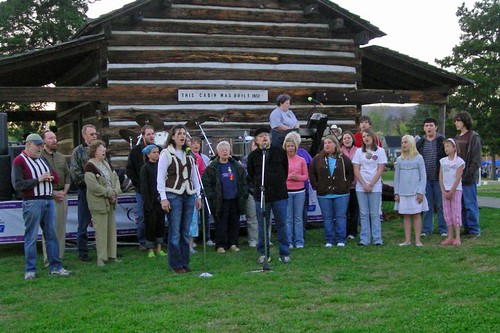


The purpose of Relay For Life is to celebrate the lives of those who have battled cancer. The strength of survivors inspires others to continue to fight. Remember loved ones lost to the disease. At Relay, people who have walked alongside people battling cancer can grieve and find healing. Fight Back. We Relay because we have been touched by cancer and desperately want to put an end to the disease. 
Posted by Richard Lawry at 7:27 PM 0 comments
Monday, November 3, 2008
Why I Relay

I am involved in Relay For Life for a number of reasons. The number one reason is because my wife is passionate about Relay. She has such a passion for Relay For Life that it rubs off on those around her. Her passion stems from her family history. Her mother died of cancer when Gina was just 21 years old. Her father had colon cancer, and all three of her sisters have had breast cancer. She is the only person in her immediate family that is cancer free.
Several years ago, Gina's sister Roberta got involved with Relay For Life in Enumclaw, Washington. For a number of years, Gina would travel to Enumclaw to be a part of Relay For Life there. Two years ago, we learned that Polk County was going to have a Relay. We got involved in the 2007 Relay, and have been involved ever since.
My uncle, Delbert Lawry, died from cancer a couple of years ago. I lost not only an uncle, but a friend and someone who was willing to help anytime. I have come to realize the importance of the work that the American Cancer Society does. It is involved in research, prevention, and helping those who are dealing with cancer.
Just about everyone has been affected by cancer in one way or another. Relay For Life is a fun way to raise money and awareness for the American Cancer Society. There is probably no other cause that a person can support that touches more lives. Relay celebrates those who have battled cancer, it remembers those who have fallen, and it provides a way to fight back. That is why I am proud to be a part of Relay For Life. I hope that you will be a part of Relay For Life too.
Posted by Richard Lawry at 7:41 AM 1 comments
Thursday, October 30, 2008
Breast Cancer Awareness

October is Breast Cancer Awareness Month.
The American Cancer Society says that mammograms detect 80 percent to 90 percent of breast cancers in women without symptoms, and all women 40 and older should get a yearly mammogram.
"Mammography remains the most effective screening test for the early detection of breast cancer available to women today," Dr. Otis W. Brawley, the American Cancer Society's chief medical officer, said in a society news release. "Women are strongly urged to schedule their mammograms yearly and to talk to their doctor regularly about their risk for breast cancer."
Early detection by mammography screening and improvements in treatment have contributed to a decline in the breast cancer death rate in the United States since 1990. However, recent evidence suggests that many women are getting mammograms at a later age, not scheduling them yearly, or aren't receiving appropriate and timely follow-up after positive breast cancer screening results.
Along with recommending yearly mammograms and clinical breast examinations for women over age 40, the American Cancer Society says that women ages 20 to 39 should undergo clinical breast examination at least once every three years. All women should be familiar with their breasts and immediately report any changes to their health care provider.
Women at high risk for breast cancer (greater than a 20 percent lifetime risk) should have an annual MRI and mammogram, and women at moderate risk (15 percent to 20 percent lifetime risk) should talk with their doctors about the benefits and limitations of adding MRI screening to their yearly mammogram.
Complete screening guidelines along with more information about breast cancer is available at www.cancer.org or call 1800.ACS.2345
Posted by Richard Lawry at 11:30 AM 1 comments
Wednesday, October 29, 2008
What Is Relay For Life?

Relay For Life is the American Cancer Society’s signature activity. It offers everyone in a community an opportunity to participate in the fight against cancer. Teams of people camp out at a local high school, park, or fairground and take turns walking or running around a track or path. Each team is asked to have a representative on the track at all times during the event. Relays are an overnight event, up to 24 hours in length.
Teams of people from all walks of life have fun while raising much-needed funds to fight cancer and raise awareness of cancer prevention and treatment.
No matter who you are, there’s a place for you at Relay. To participate, form a team, or dedicate a luminaria please call Regina at 479-394-6172 or visit http://www.cancer.org/.
Relay For Life is a life-changing event that brings together more than 3.5 million people to:
• Celebrate the lives of those who have battled cancer. The strength of survivors inspires others to continue to fight.
• Remember loved ones lost to the disease. At Relay, people who have walked alongside people battling cancer can grieve and find healing.
• Fight Back. We Relay because we have been touched by cancer and desperately want to put an end to the disease.
There is not a required amount of money to raise in order to participate in Relay For Life. The American Cancer Society's recommendation is for each participant to set a personal goal to raise $100. If you raise more, that's even better. If you do not raise $100, you are still welcome to participate. We're glad to have you. The only requirement to participate in Relay For Life is the $10 registration/commitment fee (per person) that is due upon registration. After that, anything you can raise through individual, team, or online fundraising is graciously accepted.
Posted by Richard Lawry at 11:17 AM 0 comments
Luminaria

LUMINARIA HONORING MY MOTHER IN LAW
Luminaria are paper bags filled with sand and illuminated by a small light or candle.
Gina has been involved in the American Cancer Society Relay For Life for a number of years. She first got involved by traveling to Enumclaw, Washington to be a part of the Relay For Life there. Her sister Roberta is very involved with the Enumclaw Relay For Life. Luminaria are an important part of Relay For Life events. Each Luminaria bears the name of a person who has faced cancer, or those who have lost their battle. Each bag represents a life and story, survivor or memory – all donated in the spirit of love.
The Luminaria are placed around the track and lit as sunset approaches. As night falls it is a beautiful and poignant scene to see all the lit luminaria.
LUMINARIA LINING THE TRACK AT RELAY FOR LIFE
There is a Luminaria Ceremony that offers everyone at Relay the opportunity to honor and remember those whose lives have been touched by cancer. Luminaria also raise money for Relay For Life.
GINA SPEAKING DURING THE LUMINARIA CEREMONY
Gina and I have been involved in the Relay For Life event here in Polk county for the last two years. Gina is the Relay For Life Chairperson for Polk County. It is a passion of ours because of all of the family members and friends who have battled cancer. We decorated a float for the 2007 Christmas parade here in Mena. Our theme was Luminaria. Gina made a large Luminaria from a refrigerator box, and we lit it with a floor lamp. We had Luminaria all along the sides of the float that we lit with glow sticks.
THE REFRIGERATOR BOX LUMINARIA
RELAY FOR LIFE FLOAT IN THE PARADE
If you have never been involved in a Relay For Life, find out if there is one in your community and become a part of it. In 2008 there were over 5,000 Relay For Life events with over 3 million people participating. Don't miss out on the fun of this important event. Last year over 400 million dollars was raised by Relay For Life for cancer research, education, advocacy and service. 
RELAY FOR LIFE IS FUN AND FULFILLING
Posted by Richard Lawry at 10:59 AM 0 comments




